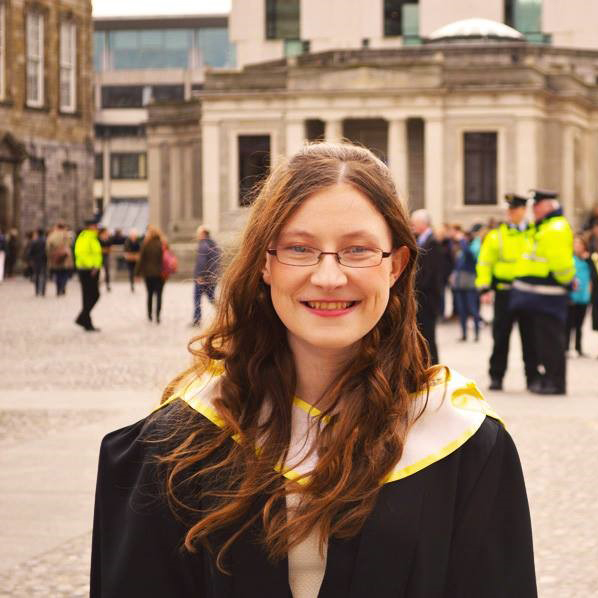Ph.D. and M.Litt.
Apply
Please do not apply for PhD or M.Litt. study until you have followed the instructions detailed below under the heading, 'Admissions Information'.
The School of English welcomes applications for two research degrees: the M.Litt. and the Ph.D. Both involve a student working closely with one or more supervisors to undertake an original independent research project, resulting in a dissertation thesis. The M.Litt. normally takes two years and the dissertation is up to 60,000 words. The Ph.D. takes up to four years and the dissertation is up 100,000 words. As well as the more conventional research dissertation, we offer the Doctor in Philosophy, Literary Practice, which comprises of an original piece of creative writing and a critical essay. We also have a Distance Ph.D. programme, to enable students to pursue a research degree remotely.
The diversity of our Faculty’s research interests means we are well-placed to supervise research in a very wide variety of areas of anglophone literary studies. The print and archival holdings of Trinity’s remarkable library underpins many of our research students’ projects. While here you will receive access to training that will develop your skills and knowledge as a researcher. You will also join a supportive and dynamic community of students, scholars, and writers in a world-leading English department right at the heart of one of the world’s great literary cities.
Current Research Students

As I approach the end of my Ph.D., I’m so grateful for the encouragement and support that I’ve found within the School of English, and for the opportunities it has given me.

The time I spent doing my Ph.D. in the School of English was the most fulfilling and intellectually stimulating experience for which I could ever have hoped. Having the time and space to work on my research while being supported by an excellent mentor was an immense privilege, but it also prepared me for life beyond the Ph.D.
Structured Ph.D.
The School of English provides doctoral training through a structured programme of research and study. Alongside pursing their original research project, Ph.D. students participate in other modules, seminars and workshops. These broaden the knowledge and skills of students in ways that are complementary to their research. They also support their wider professional development, including in aiding their entry into the academic and non-academic job markets. During the programme, Ph.D. students undergo various review processes, offering important evaluation and feedback on their progress.
Doctor in Philosophy, Literary Practice
How Do I Apply/Make an Initial Inquiry?
The Doctor in Philosophy, Literary Practice is aimed at those interested in undertaking a combination of creative and critical writing at doctoral level. The main body of the thesis dissertation is an extended piece of creative writing, normally between 60,000 and 80,000 words in length. This may take the form of a novel, a collection of short stories or poetry, or a work of non-fiction, such as a memoir or piece of travel writing, or another form of output as agreed with the project’s supervisors. This is accompanied by a critical essay that intersects with the creative project. This might take the form of a scholarly investigation or commentary of some kind, or offer a reflection on the student’s own aesthetic practice. Again, its exact nature and scope will be decided by the student in consultation with their supervisors. The Doctor in Philosophy, Literary Practice is normally supervised by two members of the School of English, one a specialist in creative writing and the other a researcher with expertise in an area connected to the critical portion of the project.
Applying for the Doctor in Philosophy, Literary Practice
The Doctor in Philosophy, Literary Practice generates a high volume of queries. To deal with these queries more effectively, we have initiated a separate initial inquiry protocol for this strand.
IMPORTANT: You must not apply online for a Doctor in Philosophy, Literary Practice unless you have been pre-approved to do so by the School – all unauthorised applications will be rejected.
If you are interested in applying for the programme:
- Please download the Doctor in Philosophy, Literary Practice inquiry template found here fill it in, and send it to the Director of Postgraduate Teaching and Learning, Prof. Aileen Douglas (adouglas@tcd.ie) no later than November 1st, 2023 if you wish to be considered for March 2024 entry and no later than December 1st, 2023 if you wish to be considered for September 2024 entry. Use the subject line 'Doctor in Philosophy, Literary Practice Inquiry'. Further correspondence with the DPTL re: your prospective application will generally not be entered into at this time.
- Prof. Douglas will forward these details on to colleagues who work in Creative Writing after the December deadline. At that stage, if a member of staff is interested in following up with you re: your proposed project, they will generally be in touch within 1-2 weeks. If a colleague is willing to consider taking you on as a PhD student, after discussion with the DPTL, you will be given the go-ahead to formally apply to the Doctor in Philosophy, Literary Practice. The instructions further down this page under the heading ‘Developing Your PhD Proposal’ also apply to LP applicants: however, please note that applicants for the Doctor in Philosophy, Literary Practice need to submit two writing samples: one piece of creative work (5000 words) and one critical essay (3000 words).
- Please remember that being given permission to apply is not a guarantee of ultimate acceptance. We have limited supervision capacity in this subject area and unfortunately, we often turn down qualified applicants for this and for other reasons. We therefore advise you to consider applying to other institutions in addition to making inquiries at TCD.
- If you have been given the go-ahead to apply for the Doctor in Philosophy, Literary Practice, you should upload all materials related to your application by the date listed on this website in due course. Full details on the materials which we need for a PhD application are listed on this page under 'Admissions Information'. Please follow these instructions in full. All materials, references and supplementary information must be provided before your application can be formally assessed. We reserve the right to reject incomplete applications after this date. You should use the ‘Doctor in Philosophy, English’ application link.
- Applications will then be considered by your prospective 'Doctor in Philosophy, Literary Practice' supervisors and by the School's admissions committee, who will read all applications in this area and the make the final recommendation as to whether a place can be offered to an applicant. This decision will generally be passed on to the applicant by the DPTL before the end of April.
Non-Resident/Distance Ph.D. Programme
The Non-Resident PhD programme allows students who wish to undertake a structured Ph.D. within the School of English remotely from anywhere in the world. As part of this programme you will be a fully registered student of the School of English, Trinity College Dublin with access to our libraries and services whether you are on- or off-campus. A programme of online seminars and discussion groups will be made available to enable connection with fellow Trinity researchers within and across disciplines. The programme is four years full-time and six years part-time. The School is committed to providing the same quality of supervision for distance students as for those present on campus in person and will strive to ensure they feel part of the academic community. Students undertaking the Distance PhD will need to conform to the same regulations, expectations and procedures as our general PhD students.
Distance PhD applicants will also need to confirm that they have access to a suitable workspace and to the equipment (i.e. laptop or PC) and internet access which is needed to successfully engage in this mode of study. They are also be expected to keep in regular touch with their supervisor via email and online-videoconferencing platforms such as Zoom, Skype and Microsoft Teams. They will also be expected to meet once a term with their thesis committee via one of these platforms. Students will also be expected to engage with webinars and online conferences within the School and in the College more widely. Please note that that students are normally expected to be on-campus in Dublin for their Confirmation hearing approximately half-way through their studies and for their Viva Voce examination at the end of their studies.
Distance PhD students in the School (as within the College in general) will follow a structured PhD model which requires them to attain 20 ECTS of taught credits in their first 18th months of study.
Click here for further information about Trinty's Non-Resident/Distance Ph.D. Programme
Applying for Non-Resident Study
Prospective applicants can only proceed to a formal application for the Non-Resident Programme if they have been vetted and approved of by the Director of Postgraduate Teaching and Learning (Dr Carroll) and by a prospective supervisor beforehand. There is a form which both the applicant and the prospective supervisor need to fill in and sign, and an application link which needs to be sent on by the DPTL. The Non-Resident PhD programme cannot be applied for on the usual College online applications site.
By undertaking a Non-resident Ph.D., students are ineligible for university funding schemes and may be ineligible for funding from other bodies. Students will be responsible for arrangements and bear all personal costs associated with their programme of study, including travel and technology-related costs.
Admissions Information
How Do I Make an Initial M.Litt. or PhD Inquiry?
The School receives many postgraduate research admissions and supervision inquiries every year. To make the processing of initial expressions of interest more efficient for prospective applicants and for staff, we now require prospective PhD or M.Litt. applicants to fill in this inquiry template before their supervision/admissions query can be considered. Once you have completed this template you may forward it to the staff member who you feel would be a suitable PhD supervisor, or send it to the Director of Postgraduate Teaching and Learning (Dr Jane Carroll, carrolj1@tcd.ie) for circulation if no suitable supervisor seems immediately apparent.
The list of staff research interests and supervision interests can be found here: staff research interests . You should consult it before filling in the inquiry template. Do not contact MORE THAN ONE staff member with your initial query. It causes confusion and delays when a prospective applicant emails several staff members with the same query at once.
Developing Your PhD Proposal/Application Materials:
It is strongly advised that you develop your proposal in consultation with a relevant staff member, rather than applying online without contacting the School beforehand. If a staff member is interested in your initial project outline (as contained within the template) and has supervision capacity, they may ask you for further information and they may subsequently agree to work as you develop your proposal. Please note that an initial expression of interest from an academic member of staff is not in itself a guarantee of acceptance. All PhD applications are assessed by the prospective supervisor and by the School’s PhD admissions committee.
Your Ph.D. proposal should be around 2,000-3,000 words. This normally includes: an overview indicating the contribution to scholarship the proposed project will make in relation to the existing critical literature; a chapter-by-chapter outline of the proposed dissertation; a statement on methodology; and a short preliminary bibliography (listing 30-50 items of primary and secondary literature).
In addition to the research proposal, as part of your application you will need to submit: transcripts; degree certificates; a CV; proof of English competency, if English is not your native language; two academic references; and a writing sample (approximately 5,000 words).
Applications will not be considered until all documents are submitted, including both references. It is the responsibility of the applicant to make sure that all the necessary documents are uploaded as soon as possible after an initial application is opened online, and to check with referees to make sure that they have uploaded their references.
Acceptance depends on several criteria: your undergraduate degree (normally at least an upper-second class standard or GPA of 3.3 is required), the viability and originality of your research proposal, and the strength of your supporting academic references.
Applicants should also note that that the demand for research places in the School of English at Trinity College Dublin is high, and that sometimes excellent candidates are turned down because of the unavailability of staff to supervise in that area.
Doctor in Philosophy, Literary Practice Application Materials:
Applicants for the Doctor in Philosophy, Literary Practice need to submit two writing samples: one piece of creative work (5000 words) and one critical essay (3000 words).
Funding
IMPORTANT: A full revision of College internal PhD award schemes is currently being undertaken to ensure an equitable level of stipend for students in receipt of internal awards. Further information will be posted here in the Autumn.
Prospective applicants should very carefully consider how they intend to fund their studies in light of the scarcity of funding and the high costs of living and renting here in Dublin.
Various external bodies do offer funding. The Irish Research Council runs an annual scheme for doctoral candidates, advertised early in the autumn of each year. These awards are the most substantial funding available to our Ph.D. candidates. Prospective students may also be eligible for a grant via Student Universal Support Ireland (SUSI). Further advice and information on funding is also available on from the Higher Education Authority.




